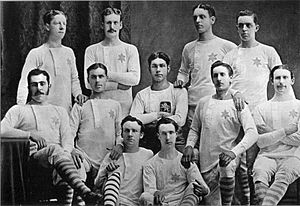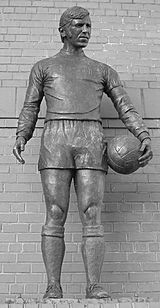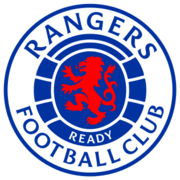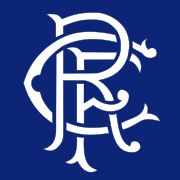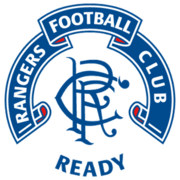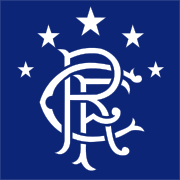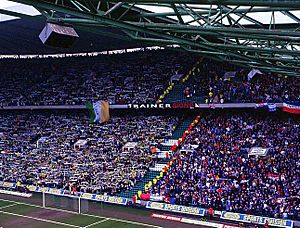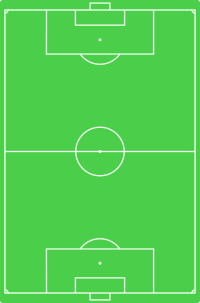Rangers F.C. facts for kids
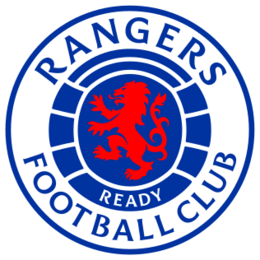 |
||||
| Full name | Rangers Football Club | |||
|---|---|---|---|---|
| Nickname(s) | The Gers The Light Blues The Teddy Bears |
|||
| Founded | March 1872 | |||
| Ground | Ibrox Stadium | |||
| Capacity | 51,700 | |||
| Owner | The Rangers Football Club Ltd | |||
| Chairman | Andrew Cavenagh | |||
| Head coach | Russell Martin | |||
| League | Scottish Premiership | |||
| 2015–16 | Scottish Championship, 1st (promoted) | |||
|
||||
Rangers Football Club is a professional football team from Glasgow, Scotland. They play in the Scottish Premiership, which is the top football league in Scotland. People sometimes call them Glasgow Rangers, but that's not their official name.
Rangers is one of Scotland's oldest football clubs. It was started in March 1872 by four teenage boys who were walking through West End Park (now Kelvingrove Park). They talked about creating a football club. Their first game was in May of the same year against a team called Callander at Glasgow Green.
Rangers' home stadium is Ibrox Stadium. It was designed by Archibald Leitch and opened in 1929. It's one of Scotland's biggest football stadiums. The team has always worn royal blue shirts.
Rangers has won the Scottish League title a record 55 times. They have also won the Scottish Cup 34 times and the Scottish League Cup a record 28 times. They have won all three of these trophies in the same season seven times!
In Europe, Rangers won the European Cup Winners' Cup in 1972. They were also finalists in that competition twice before, in 1961 and 1967. They were the first British club to reach a final in a UEFA tournament. Rangers also reached the UEFA Cup Final in 2008 and the UEFA Europa League Final in 2022. With all these trophies, Rangers is one of the most successful football clubs in the world.
Rangers has a big rivalry with Celtic, another Glasgow club. Together, they are known as the Old Firm. This is one of the biggest football rivalries in the world. Rangers has a huge number of fans, with over 600 supporters' clubs in 35 countries. In 2008, about 200,000 Rangers fans traveled to Manchester for the UEFA Cup final. In 2022, around 100,000 fans went to Seville for the UEFA Europa League Final.
Rangers was one of the first teams in the Scottish Football League. They stayed in the top division until a financial problem in the 2011–12 season. The club had to restart in the fourth tier of Scottish football. Rangers then won three promotions in four years, returning to the Premiership for the 2016–17 season. During their climb back, they became the only club in Scotland to have won every domestic trophy. In 2020–21, Rangers won their first Scottish championship in ten years. This was their 55th league win, a world record at the time.
Contents
- Club History
- How Rangers Started and Early Years
- Successful Managers: Bill Struth and Scot Symon
- Ibrox Tragedy and European Glory
- The "9-in-a-row" Era
- New Managers and More Trophies
- Walter Smith's Return and Ally McCoist's Time
- Financial Challenges and Lower Leagues
- Return to the Top and Recent Managers
- The Steven Gerrard Era
- Recent Managers and New Ownership
- Club Crest and Colours
- Stadium and Training Facilities
- Club Identity and Supporters
- Club Records
- Players
- Club Staff
- Managers
- Club Honours
- UEFA Club Coefficient Rankings
- Notable Former Players
- Club Sponsors
- See also
Club History
How Rangers Started and Early Years
Rangers was founded by four friends: brothers Moses McNeil and Peter McNeil, Peter Campbell, and William McBeath. They met in West End Park (now Kelvingrove Park) in March 1872. Their very first game was a friendly match against Callander on Glasgow Green, which ended in a 0–0 draw. David Hill was also one of the early members.
In 1873, the club held its first official meeting and chose its staff. By 1876, Moses McNeil became Rangers' first player to play for his country, representing Scotland against Wales. In 1877, Rangers reached the Scottish Cup final but didn't play the replay, so Vale of Leven won the cup. The next year, Rangers won their first major trophy, the Glasgow Charity Cup, beating Vale of Leven 2–1. The first game against Celtic happened in 1888. Rangers lost that friendly match 5–2.
The 1890–91 season was the start of the Scottish Football League. Rangers, playing at the first Ibrox Stadium, was one of the ten original teams. Their first league game on August 16, 1890, was a 5–2 win against Heart of Midlothian. They finished tied for first place with Dumbarton, and after a play-off game ended 2–2, they shared the title. Rangers won their first Scottish Cup in 1894, beating Celtic 3–1 in the final. By 1900, Rangers had won two league titles and three Scottish Cups. During William Wilton's time as manager, Rangers won ten league titles.
Successful Managers: Bill Struth and Scot Symon
Bill Struth became manager after William Wilton passed away in 1920. He was Rangers' most successful manager, leading the club to 14 league titles before World War II. On January 2, 1939, a record 118,567 fans watched Rangers beat Celtic in the New Year's Day Old Firm match. Struth managed the club for 34 years until 1954, winning more trophies than any other manager in Scottish football history. He won 18 league championships, 10 Scottish Cups, and many other honors.
Scot Symon continued this success, winning six league championships, five Scottish Cups, and four League Cups. He was the second manager to win the domestic treble in the 1963–64 season. This was the time of 'Slim' Jim Baxter, one of the club's greatest players.
Rangers reached the semi-finals of the European Cup in 1960, losing to German club Eintracht Frankfurt. In 1961, Rangers became the first British team to reach a European final, playing against Italian side Fiorentina in the Cup Winners' Cup final, but they lost. They reached the final of the same competition again in 1967, losing to Bayern Munich.
Ibrox Tragedy and European Glory
The Ibrox disaster happened on January 2, 1971. During an Old Firm game, 66 lives were lost due to a large crowd crushing on a stairway exit. An investigation found that the crush likely happened ten minutes after the game ended. A special match was played to raise money for the victims' families, with a combined Rangers and Celtic team playing a Scotland team.
In 1972, Rangers achieved European success. They won the European Cup Winners' Cup by beating Dynamo Moscow 3–2 in Barcelona. Captain John Greig received the trophy. Rangers were banned from European competitions for two years because of fan behavior, but this was later reduced to one year.
The next season, the club played in the first European Super Cup against European Cup holders Ajax in January 1973. Ajax won the two-game series 6–3.
Under manager Jock Wallace, Rangers had great success at home. In his first season, Rangers won the Scottish Cup. In 1974–75, Wallace led Rangers to their first League championship in 11 years. He then won the treble in the following season, and again in 1977–78.
John Greig managed the team for five years but couldn't win the league. He was replaced by Wallace, who returned in 1983. However, Wallace couldn't repeat his earlier success and was replaced by Graeme Souness in 1986.
The "9-in-a-row" Era
From the 1988–89 season until the 1996–97 season, Rangers won the league title every year. This amazing "nine-in-a-row" achievement matched Celtic's record. Graeme Souness managed the first three of these seasons, and Walter Smith managed the next six.
A memorable season was 1990–91, when Rangers won the championship on the last day with a 2–0 victory over Aberdeen. The 1992–93 season was special because the club won a domestic treble (all three main trophies) and had a great run in the first-ever UEFA Champions League.
Rangers secured their ninth league title in a row on May 7, 1997, with a 1–0 win against Dundee United.
New Managers and More Trophies
In 1998, Dick Advocaat from the Netherlands became Rangers' first foreign manager. He brought in new players, and the team quickly won their sixth domestic treble. They won the league championship at Celtic Park on May 2, 1999. They won a second league title in a row by a record 21 points, also winning the Scottish Cup.
Advocaat left in December 2001 and was replaced by Alex McLeish. In his first full season, 2002–03, McLeish became the sixth Rangers manager to win a domestic treble. Rangers won their 50th league title on the last day of the season with a 6–1 win over Dunfermline Athletic.
The 2004–05 season brought more success. Rangers won the league championship in a dramatic final day. The trophy was flown by helicopter to Easter Road after Celtic lost their game, meaning Rangers won the title.
After a tough start to the 2005–06 season, McLeish announced he would step down. Frenchman Paul Le Guen took over in 2006. He led Rangers to the last 16 of the Champions League, a first for a Scottish team since 1993. However, Le Guen left the club in January 2007.
Walter Smith's Return and Ally McCoist's Time
On January 10, 2007, former manager Walter Smith returned to Rangers, with Ally McCoist as his assistant.
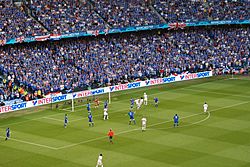
In the 2007–08 season, Rangers reached the UEFA Cup final, beating several strong teams. They lost 2–0 to Zenit Saint Petersburg in the final in Manchester. About 200,000 Rangers fans traveled to Manchester for the event.
Rangers won their 52nd league championship on the last day of the 2008–09 season. They also won the Scottish Cup. The 2009–10 season saw Rangers win their fifth domestic final in a row, beating St Mirren in the Scottish League Cup. They also kept the league championship title. In the 2010–11 season, Smith's last, Rangers won the League Cup and a third consecutive league title.
Ally McCoist became manager in June 2011. The 2011–12 season was difficult, with Rangers being knocked out of European competitions early. The club faced financial problems and was deducted 10 points in the league. Rangers finished second that season.
Financial Challenges and Lower Leagues
On June 1, 2012, due to financial issues, the original Rangers company was closed down. A new company, Sevco Scotland Ltd (later renamed The Rangers Football Club Ltd), bought the club's business and assets. The new company was placed in the lowest division of Scottish football, the Third Division, for the 2012–13 season.
Even in the lower leagues, Rangers had huge support. Their first league match in the Third Division had a crowd of 49,118, a world record for a fourth-tier league game. Rangers won the Third Division title on March 30, 2013.
The 2013–14 season started very well, with Rangers winning their first 15 league games in League One. They won the League One title and promotion to the second tier, finishing the season unbeaten in the league.
Playing in the Scottish Championship in 2014–15 was tougher. Ally McCoist resigned and was replaced by Kenny McDowall as caretaker, then by former player Stuart McCall. Under McCall, Rangers finished third and reached the Premiership play-off final, but lost to Motherwell.
Return to the Top and Recent Managers
In June 2015, Mark Warburton became manager. Rangers won the 2015–16 Scottish Championship and returned to the Scottish Premiership. They also reached the 2016 Scottish Cup Final, beating Celtic in the semi-final, but lost to Hibernian in the final. Warburton left in February 2017, and Pedro Caixinha took over.
Caixinha's first full season started with a shocking loss to Luxembourg team Progrès Niederkorn in the Europa League qualifying round. Caixinha was sacked in October 2017. Graeme Murty became caretaker manager again, then was appointed until the end of the season. He was sacked in May 2018 after a big loss to Celtic.
The Steven Gerrard Era
On May 4, 2018, former Liverpool and England captain Steven Gerrard became the new manager. Gerrard's time started well, with Rangers unbeaten in their first 12 games and reaching the UEFA Europa League group stage. In December, Rangers beat Celtic at Ibrox, their first league win against them since 2012.
The 2019–20 season saw Rangers qualify for the UEFA Europa League group stage again. They reached the League Cup final but lost to Celtic. In December, Rangers beat Celtic 2–1 at Celtic Park, their first win there since 2010. However, a dip in form meant Celtic won the league title that season, which was ended early due to the COVID-19 pandemic in the United Kingdom.
On March 7, 2021, Rangers won the league title for the first time in ten years. They finished the league season undefeated, with a club record 102 points.
Recent Managers and New Ownership
Midway through the 2021–22 season, Steven Gerrard left for Aston Villa. Former Rangers player Giovanni van Bronckhorst became manager in November 2021. He led Rangers to their first European final in fourteen years, the 2022 UEFA Europa League Final, and also won the Scottish Cup.
In the 2022–23 season, Rangers played in the UEFA Champions League group stage for the first time since 2010–11. However, they lost all six group matches. Giovanni van Bronckhorst was sacked in November 2022. Michael Beale took over but was sacked in October 2023.
Philippe Clement was appointed manager on October 15, 2023. The club won their 28th League Cup title, their first in twelve years. Rangers finished second in the league and Scottish Cup. Clement was sacked as manager on February 23, 2025.
On May 30, 2025, Rangers announced that a group led by US businessman Andrew Cavenagh and 49ers Enterprises bought 51% of the club's shares, completing a big takeover.
Club Crest and Colours
Club Crest
Rangers is unique because it has two official crests. The original scroll crest is on the team's shirts. The lion rampant club crest is used for media, merchandise, and official documents. Both crests have changed a little over time.
The scroll crest, which shows the letters RFC overlapping, is believed to have been used since 1872. The lion rampant club crest was introduced in 1959. It featured a lion, an old-style football, and the club's motto Ready (short for Aye Ready, meaning Always Ready in Scots). This crest was updated in 1968 and again in the early 1990s and 2020. The modern circular crest is often seen on merchandise but not usually on the team's shirt. In 1968, the scroll crest returned to the shirt.
The scroll crest on the shirt has changed slightly. Between 1990 and 1994, 'Rangers Football Club' and the 'Ready' motto were added. From 1997 to 1999, the scroll crest was inside a shield. After winning their 50th league title and a domestic treble in 2003, five stars were added above the scroll crest. Each star represents ten league titles. In 2012, a special crest was worn to celebrate the club's 140th anniversary.
- Kit crest history
Club Colours
Rangers' club colours are royal blue, white, and red. For almost 50 years, the club wore a plain lighter blue home shirt. From 1879, they wore a lighter blue and white hooped shirt for four seasons. Since 1921, the home shirt has always been royal blue. It's usually worn with white shorts and black socks with red tops. Sometimes, the shorts and socks might be different, like white socks or royal blue shorts and socks.
Rangers' away kits have changed much more than the home kit. The first away kit, used from 1876 to 1879, was all white with blue and white hooped socks and a light blue six-pointed star on the chest. White and red are the most common colours for away kits, but dark and light blue have also been used. In 1994, Rangers introduced a third kit. This is worn if both the home and away kits clash with the opponent's colours.
| Selection of Rangers kits through history | |||||||||||||||||
|---|---|---|---|---|---|---|---|---|---|---|---|---|---|---|---|---|---|
|
|
|
|
|
|
||||||||||||
Kit Suppliers and Shirt Sponsors
Since 1978, Rangers has had a specific company make their kits, starting with Umbro. Since 1984, they have also had sponsors on their shirts.
| Kit suppliers | ||
|---|---|---|
| Period | Supplier | |
| 1978–1990 | Umbro | |
| 1990–1992 | Admiral | |
| 1992–1997 | Adidas | |
| 1997–2002 | Nike | |
| 2002–2005 | Diadora | |
| 2005–2013 | Umbro | |
| 2013–2018 | Puma | |
| 2018–2020 | Hummel | |
| 2020–2025 | Castore | |
| 2025–present | Umbro | |
| Front of shirt sponsors | |
|---|---|
| Period | Sponsor |
| 1984–1987 | CR Smith |
| 1987–1999 | McEwan's Lager |
| 1999–2003 | NTL |
| 2003–2010 | Carling |
| 2010–2013 | Tennent's |
| 2013–2014 | Blackthorn |
| 2014–2023 | 32Red |
| 2023–present | Unibet |
| Back of shirt sponsors | ||
|---|---|---|
| Period | Sponsor | Position |
| 2017–2020 | Utilita | Top |
| 2020–2021 | The Energy Check | Bottom |
| 2020–present | SEKO Logistics | Top |
| 2021–2022 | Sportemon Go | Bottom |
| 2022–2023 | Socomec | |
| Sleeve sponsors | ||
|---|---|---|
| Period | Sponsor | |
| 2020–2022 | Tomket Tires | |
| 2022–present | BOXT | |
| Shorts sponsors | ||
|---|---|---|
| Period | Sponsor | |
| 2023–present | AIM Building & Maintenance Services | |
Sometimes, Rangers wear shirts without their usual sponsor if there are rules against advertising certain products in other countries. For example, they wore a different logo or no sponsor when playing in France or Croatia.
Club Mascot
Broxi Bear is the official mascot of Rangers. His name comes from the stadium, Ibrox, with the letters mixed up. Broxi is a brown bear who wears a Rangers kit. He first appeared on November 13, 1993. Broxi used to have a "wife" named Roxi and a "son" named Boris, who appeared on club merchandise. Roxi and Boris were brought back for on-field appearances in 2017.
Stadium and Training Facilities
Before Ibrox Stadium, Rangers played at different grounds in Glasgow. These included Fleshers' Haugh, Burnbank Park, and Kinning Park. From 1887, they played at the first Ibrox Park. The current Ibrox Stadium was designed by Archibald Leitch, a Rangers fan. It opened on December 30, 1899, with Rangers beating Hearts 3–1.
Rangers' training facility is in Auchenhowie, near Milngavie, Glasgow. It was first called Murray Park, but is now the Rangers Training Centre. It was suggested by manager Dick Advocaat in 1998 and finished in 2001, costing £14 million. It was the first special training facility of its kind in Scotland. It has nine football pitches, a gym, a hydrotherapy pool, and a video-editing room. Rangers' youth teams also use the center. Other club and national teams have used it for training too.
Club Identity and Supporters
Rangers is one of the most supported clubs in Europe. From 2013 to 2018, Rangers had the 18th highest average home league attendance in the world.
The Rangers Worldwide Alliance connects supporters clubs around the world. There are over 600 registered supporters clubs with more than 30,000 members. The club's website lists over 100 supporters' clubs in Great Britain and Northern Ireland, and over 100 more in 35 other countries.
Rangers fans have helped set attendance records. The highest home league attendance was 118,567 against Celtic on January 2, 1939. The overall record attendance for a Rangers match was 143,570 against Hibernian in the Scottish Cup semi-final in 1948.
In 2008, about 200,000 Rangers fans traveled to Manchester for the UEFA Cup Final. In 2022, around 100,000 fans traveled to Seville for the UEFA Europa League Final. Spanish police praised Rangers supporters for their good behavior in Seville.
The supporters group Club 1872 owns shares in the club.
Club Rivalries
Rangers' biggest rivalry is with their Glasgow neighbors, Celtic. These two clubs are known as the Old Firm. The first Old Firm match was won by Celtic, and they have played hundreds of games since.
Rivalries also exist with other clubs. A strong rivalry with Aberdeen grew over time, especially after some intense matches in the late 1970s and 1980s.
When Rangers restarted in the Third Division in 2012–13, their old rivalry with Queen's Park was renewed for the first time since 1958. Matches with Queen's Park were called the "Original Glasgow derby" or the "Oldest Derby in the World."
Social Responsibility
Rangers works to be a positive part of the community. The club has a strong history of supporting charities and promoting good behavior.
Support for Charities
The Rangers Charity Foundation started in 2002. It does a lot of charitable work with Rangers staff and players. The foundation partners with organizations like UNICEF and Erskine, and has donated over £2.3 million. Besides raising money, the foundation often brings sick, disabled, and disadvantaged children to matches and stadium tours, where they can meet the players.
In 2008, Rangers became the first Scottish club to partner with UNICEF. The Charity Foundation has supported projects in Togo and India, and helped fund one million vaccinations for children. The club also strongly supports Erskine, which provides medical care for British Armed Forces veterans. In 2015, Rangers held a charity match for former player Fernando Ricksen, who had motor neurone disease, raising £320,000 for him and MND Scotland.
Work in the Community
The club and its Charity Foundation run programs in the community. These include courses to help veterans with challenges, raise awareness about social issues, and help unemployed people find work. In October 2015, the club started its Ready2Succeed program, a ten-week course to build confidence and job skills through football and fitness. Rangers players also visit the Royal Hospital for Children in Glasgow every year during the holidays, giving out presents and donating to the hospital's activity fund.
Club Records
Team Records
- Highest attendance
- 143,570 vs Hibernian, March 27, 1948
- UK record home attendance
- 118,567 vs Celtic, January 2, 1939
- Highest European attendance
- 100,000 vs Dynamo Kyiv, September 16, 1987
- World record fourth-tier attendance
- 50,048 vs Berwick Rangers, May 4, 2013
- Unbeaten league seasons
- 1898–99 (Rangers won all 18 league matches) and 2020–21
- Highest scoring match
- 14–2 vs Whitehill, September 29, 1883
- 14–2 vs Blairgowrie, January 20, 1934
- Record league victory
- 10–0 vs Hibernian, December 24, 1898
Player Records
- Most appearances
- Dougie Gray, 940 games, 1925–1947
- Most league appearances
- Sandy Archibald, 513 games, 1917–1934
- Most goals scored
- Jimmy Smith, 381 goals, 1929–1946
- Most league goals
- Jimmy Smith, 300 goals, 1929–1946
- Most Scotland caps while playing at Rangers
- Ally McCoist, 61 caps, 1983–1998
Players
First-team Squad
|
|
On Loan
|
Academy Squads
For more details on the academy squads, see Rangers F.C. B Team and Academy.
Retired and Reserved Numbers
- Number 12 is reserved for the fans (often called the 12th man)
Club Staff
Board of Directors
Rangers Football Club is run by The Rangers Football Club Limited ("TRFCL"). This company is part of a larger company called Rangers International Football Club Limited ("RIFC"). RIFC also owns other businesses related to Rangers, like Rangers Retail Ltd and Rangers Media Ltd.
- Rangers International Football Club Limited
As of July 11, 2025
| Position | Name |
|---|---|
| Chairman | Andrew Cavenagh |
| Vice-chairman | Paraag Marathe |
| Non-executive director | Andrew Clayton |
| John Halsted | |
| Gene Schneur | |
| Mark Taber | |
| George Taylor | |
| Fraser Thornton |
- Corporate Staff
As of July 11, 2025
| Position | Name |
|---|---|
| Chief executive officer | Patrick Stewart |
| Sporting director | Kevin Thelwell |
| Technical director | Dan Purdy |
| Interim chief commercial officer | Sean Jefferson |
| Chief financial officer | James Taylor |
| Operations director | Peter Dallas |
| Company secretary and legal director | Graham Horsman |
First-team Staff
As of July 11, 2025
| Position | Name |
|---|---|
| Head coach | Russell Martin |
| Assistant head coach | Matt Gill |
| First team coach | Mike Williamson |
| Goalkeeping coach | Sal Bibbo |
| Pathway coach | Brian Gilmour |
| Head of first-team operations | Hannah MacLean |
| Head of scouting operations | Fraser Murray |
| Lead UK scout | Mervyn Day |
| Lead Scotland scout | Ian Murdoch |
| Lead international scout | Anthony Galinski |
| Scouts | Timo Cato Ludovic Lemor Luke Platt |
| Head of performance | Rhys Owen |
| Head of nutrition and performance coach | Craig Flannigan |
| Physical performance coach | Calum MacMaster |
| Head of performance physiotherapy | Kevin Bain |
| Head of rehabilitation | Russell Parker |
| Head of physiotherapy | Jonathon Skinner |
| Club doctor | Gary Ramsey |
| Masseurs | David Lavery Paul Shields |
| Head of analysis | Graeme Stevenson |
| Performance analysts | Adam Berry Euan Fotheringham |
| Kit operations manager | Luke Murphy |
| Kit logistics coordinator | David MacGregor |
Managers
Twenty people have been managers of Rangers. Before 1899, five people served as secretaries who chose the team. The longest-serving manager was Bill Struth, who managed for over 34 years. Rangers has had five foreign managers. Graeme Souness is the only player-manager.
The most successful manager in terms of trophies is Bill Struth, with eighteen League titles, ten Scottish Cups, and two League Cups. William Waddell won the European Cup Winners' Cup.
|
Club Honours
| Type | Competition | Titles | Seasons |
|---|---|---|---|
| Domestic | Scottish League Championship | 55s |
1890–91, 1898–99, 1899–1900, 1900–01, 1901–02, 1910–11, 1911–12, 1912–13, 1917–18, 1919–20, 1920–21, 1922–23, 1923–24, 1924–25, 1926–27, 1927–28, 1928–29, 1929–30, 1930–31, 1932–33, 1933–34, 1934–35, 1936–37, 1938–39, 1946–47, 1948–49, 1949–50, 1952–53, 1955–56, 1956–57, 1958–59, 1960–61, 1962–63, 1963–64, 1974–75, 1975–76, 1977–78, 1986–87, 1988–89, 1989–90, 1990–91, 1991–92, 1992–93, 1993–94, 1994–95, 1995–96, 1996–97, 1998–99, 1999–2000, 2002–03, 2004–05, 2008–09, 2009–10, 2010–11, 2020–21 |
| Scottish second-tier League Championship | 1 | 2015–16 | |
| Scottish third-tier League Championship | 1 | 2013–14 | |
| Scottish fourth-tier League Championship | 1 | 2012–13 | |
| Scottish Cup | 34 |
1893–94, 1896–97, 1897–98, 1902–03, 1927–28, 1929–30, 1931–32, 1933–34, 1934–35, 1935–36, 1947–48, 1948–49, 1949–50, 1952–53, 1959–60, 1961–62, 1962–63, 1963–64, 1965–66, 1972–73, 1975–76, 1977–78, 1978–79, 1980–81, 1991–92, 1992–93, 1995–96, 1998–99, 1999–2000, 2001–02, 2002–03, 2007–08, 2008–09, 2021–22 |
|
| Scottish League Cup | 28 |
1946–47, 1948–49, 1960–61, 1961–62, 1963–64, 1964–65, 1970–71, 1975–76, 1977–78, 1978–79, 1981–82, 1983–84, 1984–85, 1986–87, 1987–88, 1988–89, 1990–91, 1992–93, 1993–94, 1996–97, 1998–99, 2001–02, 2002–03, 2004–05, 2007–08, 2009–10, 2010–11, 2023–24 |
|
| Scottish Challenge Cup | 1 | 2015–16 | |
| Continental | European Cup Winners' Cup | 1 | 1971–72 |
- record
- s shared record
Other Honours
- European Cup Winners' Cup:
- Runners-up (2): 1960–61, 1966–67
- UEFA Cup/UEFA Europa League:
- Runners-up (2): 2007–08, 2021–22
- UEFA Super Cup:
- Runners-up (1): 1972
Doubles and Trebles
- League Title, Scottish Cup, League Cup: 7
-
- 1948–49, 1963–64, 1975–76, 1977–78, 1992–93, 1998–99, 2002–03
- League Title and Scottish Cup: 11
-
- 1927–28, 1929–30, 1933–34, 1934–35, 1949–50, 1952–53, 1962–63, 1991–92, 1995–96, 1999–2000, 2008–09
- League Title and League Cup: 10
-
- 1946–47, 1960–61, 1986–87, 1988–89, 1990–91, 1993–94, 1996–97, 2004–05, 2009–10, 2010–11
- Scottish Cup and League Cup: 4
-
- 1961–62, 1978–79, 2001–02, 2007–08
Notable Statistics
Rangers was the first British team to reach a European final organized by UEFA in 1961.
UEFA Club Coefficient Rankings
| Ranking | Club | Country | 2024/25 Points | Total Points | National Association Points |
|---|---|---|---|---|---|
| 22 | Juventus | 16.250 | 74.250 | 19.446 | |
| 23 | Eintracht Frankfurt | 23.000 | 74.000 | 17.266 | |
| 24 | Club Brugge | 15.750 | 71.750 | 11.370 | |
| 25 | Rangers | 19.250 | 71.250 | 7.110 | |
| 26 | Feyenoord | 18.000 | 71.000 | 13.430 | |
| 27 | Tottenham Hotspur | 32.250 | 70.250 | 23.039 | |
| 28 | PSV Eindhoven | 21.250 | 69.250 | 13.430 |
Notable Former Players
Club Captains
For more information, see Rangers club captains.
|
Greatest-ever Team
In 1999, fans voted for the greatest Rangers team of all time. Here are the players chosen:
 Andy Goram
Andy Goram Sandy Jardine
Sandy Jardine Richard Gough
Richard Gough Terry Butcher
Terry Butcher John Greig – voted Rangers' greatest-ever player
John Greig – voted Rangers' greatest-ever player Brian Laudrup – voted Rangers' greatest-ever foreign player
Brian Laudrup – voted Rangers' greatest-ever foreign player Paul Gascoigne
Paul Gascoigne Jim Baxter – voted Rangers' third greatest-ever player
Jim Baxter – voted Rangers' third greatest-ever player Davie Cooper
Davie Cooper Ally McCoist – voted Rangers' second greatest-ever player
Ally McCoist – voted Rangers' second greatest-ever player Mark Hateley
Mark Hateley
Scottish Football Hall of Fame
As of June 1, 2020, 33 players and managers who have been part of Rangers have been added to the Scottish Football Hall of Fame:
 John Greig – 2004 Inaugural Inductee
John Greig – 2004 Inaugural Inductee Graeme Souness – 2004 Inaugural Inductee
Graeme Souness – 2004 Inaugural Inductee Sir Alex Ferguson – 2004 Inaugural Inductee
Sir Alex Ferguson – 2004 Inaugural Inductee Jim Baxter – 2004 Inaugural Inductee
Jim Baxter – 2004 Inaugural Inductee Willie Woodburn – 2004 Inaugural Inductee
Willie Woodburn – 2004 Inaugural Inductee Alex McLeish – 2005 Inductee
Alex McLeish – 2005 Inductee Willie Waddell – 2005 Inductee
Willie Waddell – 2005 Inductee George Young – 2005 Inductee
George Young – 2005 Inductee Alan Morton – 2005 Inductee
Alan Morton – 2005 Inductee Davie Cooper – 2006 Inductee
Davie Cooper – 2006 Inductee Brian Laudrup – 2006 Inductee
Brian Laudrup – 2006 Inductee Sandy Jardine – 2006 Inductee
Sandy Jardine – 2006 Inductee Willie Henderson – 2006 Inductee
Willie Henderson – 2006 Inductee Richard Gough – 2006 Inductee
Richard Gough – 2006 Inductee Walter Smith – 2007 Inductee
Walter Smith – 2007 Inductee Ally McCoist – 2007 Inductee
Ally McCoist – 2007 Inductee Eric Caldow – 2007 Inductee
Eric Caldow – 2007 Inductee Derek Johnstone – 2008 Inductee
Derek Johnstone – 2008 Inductee Bill Struth – 2008 Inductee
Bill Struth – 2008 Inductee David Meiklejohn – 2009 Inductee
David Meiklejohn – 2009 Inductee Mo Johnston – 2009 Inductee
Mo Johnston – 2009 Inductee Andy Goram – 2010 Inductee
Andy Goram – 2010 Inductee Robert Smyth McColl – 2011 Inductee
Robert Smyth McColl – 2011 Inductee Terry Butcher – 2011 Inductee
Terry Butcher – 2011 Inductee Bob McPhail – 2012 Inductee
Bob McPhail – 2012 Inductee Scot Symon – 2013 Inductee
Scot Symon – 2013 Inductee Davie Wilson – 2014 Inductee
Davie Wilson – 2014 Inductee Bobby Brown – 2015 Inductee
Bobby Brown – 2015 Inductee Jock Wallace – 2016 Inductee
Jock Wallace – 2016 Inductee Archie Knox – 2018 Inductee
Archie Knox – 2018 Inductee Ian McMillan – 2018 Inductee
Ian McMillan – 2018 Inductee Tommy McLean – 2019 Inductee
Tommy McLean – 2019 Inductee Colin Stein – 2019 Inductee
Colin Stein – 2019 Inductee
Scottish FA International Roll of Honour
The Scottish FA International Roll of Honour recognizes players who have played 50 or more international games for Scotland. As of July 1, 2021, ten players who earned caps while playing for Rangers are on this list:
 David Weir – 2006 Inductee, 69 Caps
David Weir – 2006 Inductee, 69 Caps Kenny Miller – 2010 Inductee, 69 Caps
Kenny Miller – 2010 Inductee, 69 Caps Christian Dailly – 2003 Inductee, 67 Caps
Christian Dailly – 2003 Inductee, 67 Caps Richard Gough – 1990 Inductee, 61 Caps
Richard Gough – 1990 Inductee, 61 Caps Ally McCoist – 1996 Inductee, 61 Caps
Ally McCoist – 1996 Inductee, 61 Caps George Young – 1956 Inductee, 54 Caps
George Young – 1956 Inductee, 54 Caps Graeme Souness – 1985 Inductee, 54 Caps
Graeme Souness – 1985 Inductee, 54 Caps Colin Hendry – 2001 Inductee, 51 Caps
Colin Hendry – 2001 Inductee, 51 Caps Steven Naismith – 2019 Inductee, 51 Caps
Steven Naismith – 2019 Inductee, 51 Caps Alan Hutton – 2016 Inductee, 50 Caps
Alan Hutton – 2016 Inductee, 50 Caps
Scottish Sports Hall of Fame
Three Rangers players are in the Scottish Sports Hall of Fame:
 Jim Baxter – 2002 Inductee
Jim Baxter – 2002 Inductee John Greig – 2002 Inductee
John Greig – 2002 Inductee Ally McCoist – 2007 Inductee
Ally McCoist – 2007 Inductee
Greatest-ever Ranger
John Greig was voted the greatest Rangers player ever in 1999. He was named Honorary Life President in 2015.
Club Sponsors
As of July 2025, Rangers has many sponsors:
Official Partners
- Official Kit Manufacturer, Retail, Merchandise and Licensing Partner – Umbro
- Principal Club Sponsor – Kindred Group
- Official Shirt Sponsor – Unibet
- Official Training Kit Partner – 32Red
- Official Presenting Partner – Park's Motor Group
- Official Upper Back of Shirt Sponsor and Logistics Partner – Seko Logistics
- Official Lower Back of Shirt Sponsor and Official Ibrox Stadium Payment Processing Partner – Guavapay
- Official Sleeve Partner – BOXT
- Official Women's Principal Partner and Official Women's Front Of Shirt Partner – Sportsbreaks.com
- Official Academy Partner – Carrick Packaging
- Official Academy Front of Shirt Training Wear Partner and Air Conditioning Partner – CSD Air Conditioning
- Official Destination Partner – Experience Kissimmee
- Official Lager Partner – Tennent's Lager
- Official Breakfast Cereals Partner – Kellogg's
- Official Video Gaming Partner – EA Sports
- Official Digital Auction Supplier – MatchWornShirt
- Official FX Transfer Partner – Ebury
Associate Partners
- Official Scotch Whisky Partner – Douglas Laing & Co
- Official Restaurant Partner – Black Rooster
- Official Engineering Partner – Forrest Precision Engineering
- Official Cyber Security Partner – NordVPN
- Official Electrical and Security Partner – JC Electrical & Security Solutions
- Official Ground Engineering Partner – Northern Piling
Official Suppliers
- Official Business Travel Supplier – Destination Sport Travel
- Official Match Breaks Supplier – Sportsbreaks.com
- Official Title Sponsorship Partner - William Hill
- Official Television Supplier – Sky Sports
- Official Food and Beverage Partner – Elior UK
- Official Soft Drink Supplier – Coca-Cola
- Official Hydration Partner – Lucozade Sport
- Official Personal Care Supplier – Molton Brown
- Official Rangers Legends Events Supplier – 5 Stars
- Official Events Partner – Turnberry
- Official Clothing Partner – Suited & Booted
Club & Federation Partners
- Official Club Partners – All India Football Federation, Bengalaru, and Orange County.
You can find a full list of Rangers' partners and sponsors on the official club website and in the Rangers matchday program.
See also
 In Spanish: Rangers Football Club para niños
In Spanish: Rangers Football Club para niños


